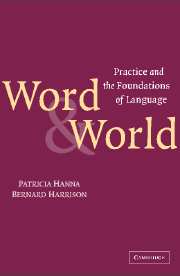3 - Out of the Prison-House
Published online by Cambridge University Press: 05 June 2012
Summary
To say that self-sufficient thought always refers to a thought enmeshed in language is not to say that thought is alienated or that language cuts thought off from truth and certainty. We must understand that language is not an impediment to consciousness …
– Maurice Merleau-PontyReference, Meaning, and Intention
The three forms of Referential Realism we have so far distinguished, albeit in a fairly brisk and sketchy way, account for a considerable part of what has taken place in analytic philosophy of language since 1900. They exhibit numerous incompatibilities, and the discussion of their relative merits has achieved considerable heights of complexity and acuity. We shall not, except occasionally and indirectly, enter into those discussions. Our object in this book is not to argue for or against any particular version of Referential Realism but to attack Referential Realism root and branch.
In opposition to the Referential Realist we shall contend that the entities “picked out by,” or “referred to,” or “designated by” all of the content-bearing expressions of a natural language are without exception linguistic constructs: things “constituted by linguistic convention,” in the sense of being things having no existence in nature prior to the constitution of language. At the same time we shall argue that such a claim yields neither of the absurd consequences it is generally supposed to yield.
- Type
- Chapter
- Information
- Word and WorldPractice and the Foundations of Language, pp. 45 - 60Publisher: Cambridge University PressPrint publication year: 2003

